MARFAM FAMILY WEEKLY 26 MARCH 2025 .

MARCH is Human Rights Month in SA and today I am focusing on the Right to Life. Earlier in the month the UN commemorated International Women’s Day. Society’s strong focus on the rights of women is, in many cases, clearly justified, while I always prefer to focus on women in the context of their family relationships. One of the rights of women over their own body can also be an abuse of another right, the right to life of an unborn child. In the face of abortion the Church consistently stresses this primary right to life. (Charter of Family Rights) The UN Universal Declaration and many constitutions, including our SA highly valued one, includes the right to life, and yet that is neglected and overridden everywhere, with women’s right over their bodies trumping the right to life of their unborn child. The abortion reality is such that it is the highest cause of death worldwide today.
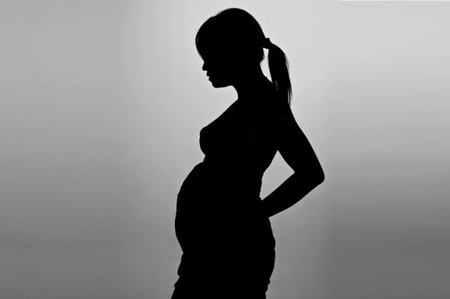
Human sexual behaviour is an important matter and teenage pregnancy is one aspect with many ways to address it. Today’s reflection is in the context of the feast of the Annunciation just celebrated, with Mary as a pregnant teenager and how the story could or does unfold.
I have a charming booklet on the love story of Mary and Joseph, called Two from Galilee by Marjorie Holmes. It broadly conforms with the gospel accounts of Matthew and Luke although they differ quite widely in their details. For example, Luke tells of Mary and the Angel Gabriel while Matthew writes of Joseph and an angel encouraging him in a dream to accept Mary’s condition. Such issues are debated widely, but a love story is a much more human account of the turmoil in two young hearts, how they came to terms with the reality and how Joseph dedicated himself lovingly to support and care for Mary in the difficult months to follow. After that he disappears almost entirely from the New Testament except for the incident when Jesus, at age 12, stayed behind in the temple going “about His Father’s business.” After that he went home and was obedient to his earthly father Joseph and mother Mary. There is no scriptural account of Joseph’s death. There was a time when we used to think of him as an old widower but again nothing is known. My reflection on the Annunciation can be meaningful in an Ignatian imaginary way.
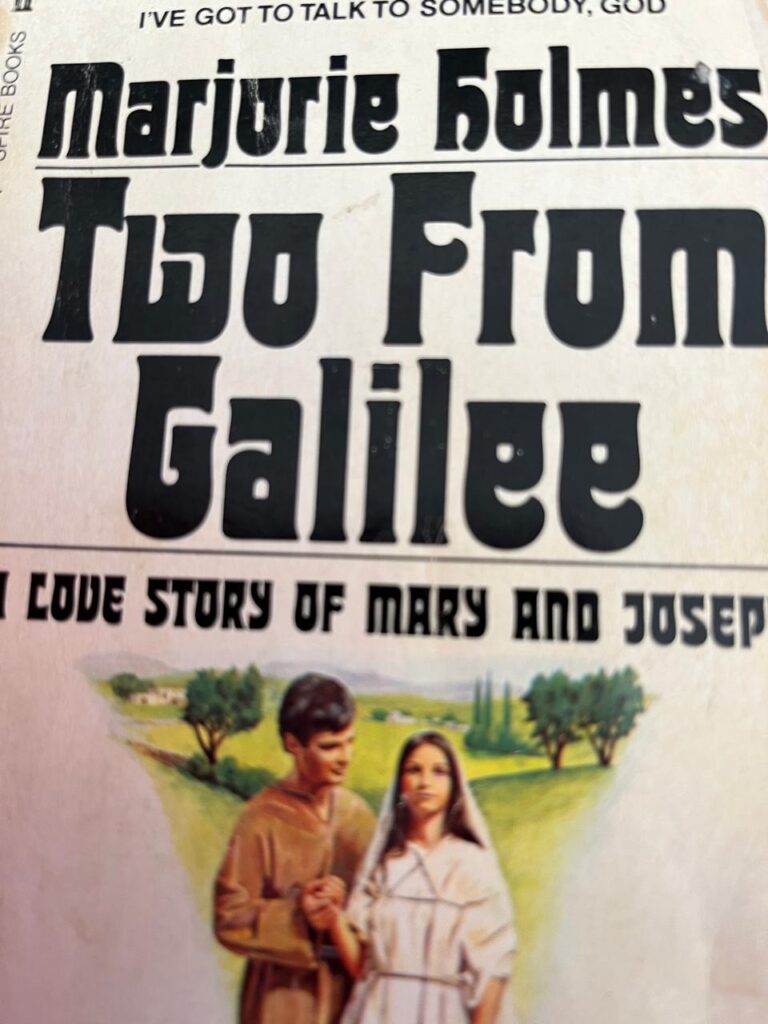
Could Mary and Joseph not have had a loving human relationship like any young couple betrothed to be married? In the booklet they, like millions from time immemorial, are planning their future life together, Joseph starts to build a house for them and Mary is thinking of her wedding and comparing her plans to others in her family. None of that was meant to be. After the angel’s visit Mary was whisked away. Some, even in her family refused to believe her unlikely story and even Joseph struggled with his doubts at first. He and Mary agonized during the months of separation and almost as soon as she returned from her visit to Elizabeth the call came that necessitated travel to Bethlehem. Mary chose to go with her new husband. Imagine the terrible hardship of that journey, her pain, their anxiety, finding no room and ending up in a cave with the animals. This was wh6eere Joseph ended up alone witnessing and assisting Mary in the awful suffering that giving birth is. He treasured those shared moments as the greatest sacrifice of love, hers and his love of Mary and the baby Jesus, surely God’s child, a beloved child given to them to love. As they spent those early days in Bethlehem and visitors came they began to foresee the suffering the child would have to undergo, Could the love in their home and their lives prepare him for the life ahead? Could this love be the Sign of Hope on their Pilgrimage of Hope as they prepared to set out on their journey into exile.
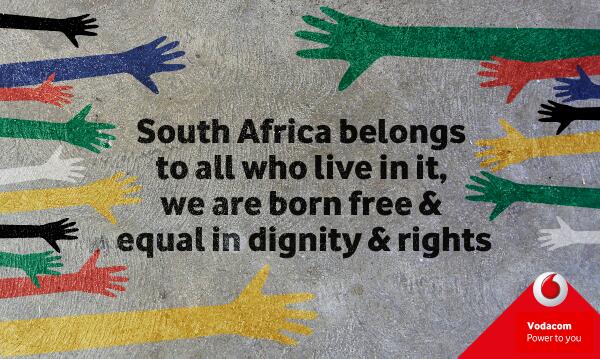
What are the lessons of life that could be learned from such a parable, a reflection on the gift of the Holy Family? Is it that our world of today has lost the value, the gift and the openness to life which is one of the Signs of Hope Pope Francis presents in his Jubilee document. What about the “right to life? Have our families and our youth lost the ability to give, to give sacrificial, selfless love?, Can the youth, boys and girls, deny themselves in the search for true love and avoid the hopelessness of unplanned pregnancies? Can all men and women cherish the gift of life, of motherhood and fatherhood, as true signs of hope in the world and all of creation?
From Two from Galilee. P 223. It seemed to Joseph that he knew now why it had been his fate to love Mary – perhaps with a greater love than man has ever been asked to give a wife. For that love was akin to the love personsified in the child, Sacrifice. God so loved the world that he would give up his own son, and that son,…. he too would love the people so much that he would be willing to give up his life. To suffer that others may live, as Mary had suffered in birth. To deny oneself for those who are dearer to us than life, . that is the true union of those who love. And that, in the end, is what will bring man back to be united with his God.
From Amoris Laetitia. 173. The grandeur of women includes all the rights derived from their inalienable human dignity but also from their feminine genius, which is essential to society. Their specifically feminine abilities – motherhood in particular – also grant duties, because womanhood also entails a specific mission in this world, a mission that society needs to protect and preserve for the good of all.
From Laudato Si.120 Since everything is interrelated, concern for the protection of nature is also incompatible with the justification of abortion. How can we genuinely teach the importance of concern for other vulnerable beings, however troublesome or inconvenient they may be, if we fail to protect a human embryo, even when its presence is uncomfortable and creates difficulties? If personal and social sensitivity towards the acceptance of the new life is lost, then other forms of acceptance that are valuable for society also wither away.
From Spes non Confundit. 9. Openness to life and responsible parenthood is the design that the Creator has implanted in the hearts and bodies of men and women, a mission that the Lord has entrusted to spouses and to their love. The desire of young people to give birth to new sons and daughters as a sign of the fruitfulness of their love ensures a future for every society. This is a matter of hope: it is born of hope and it generates hope.
PRAYER TO PROMOTE A CULTURE OF LIFE God of wisdom and love thank you for the gift of our human sexuality, for the wonderful power and opportunity as men and women to give life to all our relationships.
Thank you for the gift of our fertility. As sexual beings help us to grow in maturity, understanding and responsibility so that we may learn to use and not abuse the gift and power of sex .
Bless our Church, our world, our country and our homes with the gift of hospitality so that the least of all your people, the unborn, the unwanted, the homeless and the lost will be welcomed and not turned away, will be accepted and not rejected, will be valued and not put aside, will be given life and not condemned to death, will be loved as you love.
We ask this through the power of the Holy Spirit and in the name of Jesus, Your Son, who experienced rejection, homelessness and death for our salvation. Amen.
(Toni Rowland. Composed for the anti-abortion march in Johannesburg in 1995)

THOUGHT FOR THE DAY 26 MARCH 2025
March 26. I have taught you statutes and ordinances as the Lord my God commanded me. Jonathan had done his homework and studied the Constitution. “The Constitution of a country (1996) does not belong to any political party but to every citizen. That might be forgotten in parliament or when elections come up and all political parties are lobbying for their own policies and interpretations of the law, but whatever the outcome of an election the Constitution is the arbiter of justice. Our bishops together with other religious groups also dialogue with the state to promote pro-family, pro-life policies for the good of all, while special interest groups lobby for environmental rights, justice and more.
Reflect, share and act. Scripture: Moses said, “I have taught you statutes and ordinances as the Lord my God commanded me. Keep them and do them for that will be your wisdom and your understanding in the sight of the peoples who will say, “surely this great nation is a wise and understanding people. Make them known to your children and your children’s children.” Deut 4:1-9. Pope Francis: Families have a right to be able to count on an adequate family policy on the part of public authorities. Love overflowing with small gestures of mutual care is also civic and political and it makes itself felt in every action that seeks to build a better world. When we feel that God is calling us to intervene with others in social dynamics we should realise that this too is part of our spirituality. LS231. JUBILEE. Christian hope does not deceive or disappoint because it is grounded in the certainty that nothing and no one may ever separate us from God’s love: “Who will separate us from the love of Christ? Hardship, or distress, or persecution, or famine, or nakedness, or peril or the sword? No, in all these things we are more than conquerors through him who loved us. For I am convinced that neither death, nor life, nor angels, nor rulers, nor things present, nor things to come, nor powers, nor height, nor depth, nor anything else in all creation, will be able to separate us from the love of God in Christ Jesus our Lord” ( Rom 8:35.37-39). This hope perseveres in the midst of trials: founded on faith and nurtured by charity, As Saint Augustine observes: “Whatever our state of life, we cannot live without these three dispositions of the soul, to believe, to hope and to love” SNC 3. Choose an act of love and sacrifice from the list, also published at www.marfam.org.za

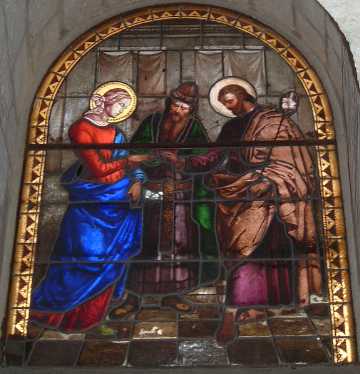


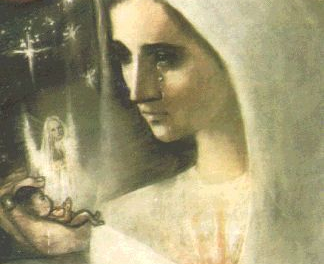
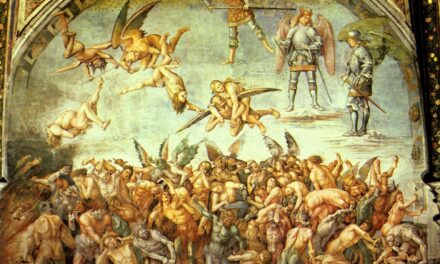

Recent Comments